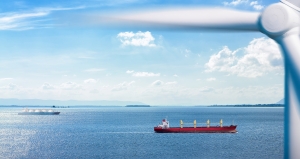


(Posted on 27/09/20)
DNV GL – Maritime, the world’s leading classification society, has released the fourth edition of its Maritime Forecast to 2050. The purpose of Maritime Forecast to 2050 is to enhance the ability of shipping stakeholders, especially shipowners, to navigate the technological, regulatory and market uncertainties in the industry, and set shipping on a pathway to decarbonization. It is based on a library of 30 scenarios which project future fleet composition, energy use, fuel mix, and CO2 emissions to 2050. Sixteen different fuel types and 10 fuel technology systems are modelled in the report.
“The grand challenge of our time is finding a pathway towards decarbonization,” said Knut Ørbeck-Nilssen, CEO of DNV GL – Maritime. “Reducing GHG emissions is rapidly becoming the defining decision-making factor for the future of the shipping industry. The pressure to act decisively is mounting. Perfect is the enemy of good, and so we mustn’t wait for an ideal solution to arrive and risk making no progress at all. Using a wide range of scenarios involving different fuel types and technologies, and varying degrees of regulatory pressure, our new report helps to map a way forward, offering shipowners clear insights on how to meet the challenges and opportunities ahead.”
The Maritime Forecast identifies the choice of fuel as the essential factor in decarbonizing shipping. The industry is at the beginning of a transition phase, with many potential options emerging alongside conventional fuels. This increasingly diverse fuel environment means that engine and fuel choice now represent potential risks that could lead to a stranded asset. Factoring in the impacts of availability, prices and policy, on different fuels, makes the choice even more complex.
To capture this complexity and help make this picture clearer the Maritime Forecast offers a wide range of scenarios, outlining the potential risks of a particular fuel choice. To make the ramifications concrete, alongside the pathways, the Maritime Forecast includes detailed analysis of a Panamax bulk carrier newbuilding. By stress testing technology decisions under the various pathways and scenarios, the Forecast presents potential performance and the carbon robustness of the various design choices.
The 30 scenarios result in widely different outcomes for the fuel mix in the fleet. In the scenarios with no decarbonization ambitions, very low sulphur fuel oil, marine gas oil and LNG dominate. While under the decarbonization pathways, in 2050 a variety of carbon-neutral fuels holds between 60% and 100% market share.
Under the decarbonization scenarios it is hard to identify clear winners among the many different fuel options. Fossil LNG gains a significant share until regulations tighten in 2030 or 2040. Bio-MGO, e-MGO, bio-LNG and e-LNG emerge as drop-in fuels for existing ships. By 2050, E-ammonia, blue ammonia and bio-methanol frequently end up with a strong share of the market and are the most promising carbon-neutral fuels in the long run.
Pacific Basin Shipping Limited, one of the world’s leading dry bulk shipping companies, has entered... Read more
AtoB@C Shipping, a subsidiary of ESL Shipping, has announced the successful delivery of Fleximar, the... Read more
Western Bulk, together with reputable Norwegian partners A/S J. Ludwig Mowinckels Rederi, Premium Maritime... Read more
Pacific Basin Shipping Limited, one of the world’s leading dry bulk shipping companies, has announced... Read more
Columbia Group anticipates a period of strong expansion as an increasing number of international shipowners... Read more
Norse?Ship Management has expanded its use of Smart Ship Hub’s high frequency sensor data and... Read more
As the maritime industry gears up to welcome the IMO’s STCW bullying and harassment training amendments... Read more
NORDEN has acquired the cargo activities of Taylor Maritime in Southern Africa (previously operated... Read more
Philippos Ioulianou, Managing Director of EmissionLink, has warned the IMO’s decision to delay... Read more
VIKAND has highlighted the need for cultural change in the maritime sector as reports of bullying, harassment... Read more